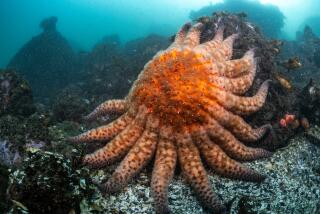Bigger Frankenfish to Fry
- Share via
The GloFish is here! Well, not exactly here, but there and everywhere else, starting today.
California is the only state to ban the genetically engineered aquarium fish, not because it could hurt people or the environment but on the ground that it’s frivolous. Luckily, the state Fish and Game Commission, refashioning itself as the California values police, has no authority over Kate Spade handbags and magic birthday candles that reignite themselves.
In an equally thoughtless decision, the U.S. Food and Drug Administration decided not to regulate the GloFish because it’s not food. It goes on sale today in every other state. Fortunately, the GloFish is a genetic joke, unlikely to make or break the environment or food safety. When it comes to more serious questions about genetically altered “Frankenfish” on the horizon, regulatory agencies will have to set aside empty rationalizations and rely on science.
The zebra fish has long been an aquarium staple, a drab but hardy black and silver fish. Now aquarium hobbyists are panting to get their nets on its souped-up version, the GloFish, which gets a red fluorescent kick from the DNA of a sea anemone.
The California Fish and Game Commission, when considering whether to exempt the GloFish from a general ban on biotech fish, agreed that the zebra fish could not survive in the state’s cold waters. The psychedelic version would fare no better outside a warmed tank and would pose no threat to native species.
But then commissioners turned the GloFish into a moral question: Is it ethical to mess with genetic destiny for amusement? One commissioner even consulted his rabbi. The answer was predictable, but the commission was created to protect public resources, not mold public morals.
Equally irresponsible was the FDA’s foolish refusal even to scrutinize the GloFish, saying it’s not a food and therefore poses no threat to the food supply. Any genetically altered organism, plant or animal, represents the potential for damage. Cross-pollination, interbreeding and crowding out of native species are complicated issues, responsibly decided only through rigorous science and utmost caution. In this case, both agencies failed the public.
They’ll have to do better when a scarier biotech fish comes up for approval in 2004: a salmon that grows at five times the normal rate. Since these salmon would be farmed in ocean pens, scientific panels already are raising alarms about their ability to escape and compete for food with wild salmon.
California will probably ban the salmon, but if the FDA approves it, the fish will inevitably find its way to state waters. And beginning today, California can expect a lively black market in fluorescent red aquarium fish.
More to Read
Sign up for Essential California
The most important California stories and recommendations in your inbox every morning.
You may occasionally receive promotional content from the Los Angeles Times.













